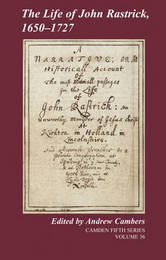
|
The Life of John Rastrick, 1650-1727
Hardback
Main Details
| Title |
The Life of John Rastrick, 1650-1727
|
| Authors and Contributors |
Edited by Andrew Cambers
|
| Series | Camden Fifth Series |
|---|
| Physical Properties |
| Format:Hardback | | Pages:228 | | Dimensions(mm): Height 222,Width 143 |
|
| Category/Genre | British and Irish History
Church history |
|---|
| ISBN/Barcode |
9781107007703
|
| Classifications | Dewey:280.4092 |
|---|
| Audience | | Professional & Vocational | |
|---|
|
Publishing Details |
| Publisher |
Cambridge University Press
|
| Imprint |
Cambridge University Press
|
| Publication Date |
23 December 2010 |
| Publication Country |
United Kingdom
|
Description
This volume makes available in print for the first time an edition of the manuscript autobiography of John Rastrick, a Lincolnshire clergyman known chiefly for leaving the Church of England at the late date of 1687 to become minister to a succession of nonconformist congregations in Spalding, Rotherham and King's Lynn. Despite his relative obscurity, Rastrick's engaging and entertaining autobiography illuminates many of the central issues in the religion and politics of the half-century after the Restoration, offering a uniquely personal perspective upon both national and local events. Rastrick provides a distinctly individual account of a minister's understanding of science and the natural world; education, reading practices and intellectual culture; marriage, family life, feuds and friendships. At once a pearl of nonconformist writing and a treasure-trove of information, Rastrick's autobiography is an essential resource for those interested in the religion, politics and culture of the late seventeenth and early eighteenth centuries.
Author Biography
Andrew Cambers has taught at the Universities of Oxford, Exeter and Lancaster. He is the author of Godly Reading: Print, Manuscript and Puritanism in England, 1580-1720 (Cambridge University Press, 2011) and has written articles in The Historical Journal, The Journal of British Studies and Past and Present.
Reviews'... we are able to see how Rastrick's religious and cultural identity was shaped within the context of Lincolnshire society, and in doing so to learn much about religion, culture and society in the period. Local readers will join historians with a wider brief in thanking Dr Cambers for making available what he rightly describes as 'this treasure trove'.' Rod Amber, Lincolnshire History and Archaeology
|